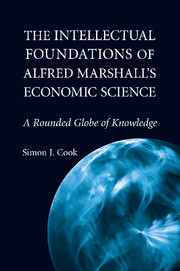Book contents
- Frontmatter
- Contents
- Acknowledgments
- List of Abbreviations
- Introduction
- PART I THE CONTEXTS OF MARSHALL'S INTELLECTUAL APPRENTICESHIP
- PART II DUALIST MORAL SCIENCE: 1867–1871
- 3 Mental Crisis
- 4 The Way of All Flesh
- 5 Political Economy
- PART III NEO-HEGELIAN POLITICAL ECONOMY: 1872–1873
- EPILOGUE: “A ROUNDED GLOBE OF KNOWLEDGE”
- Bibliography
- Index
- Titles in the series
- Frontmatter
- Contents
- Acknowledgments
- List of Abbreviations
- Introduction
- PART I THE CONTEXTS OF MARSHALL'S INTELLECTUAL APPRENTICESHIP
- PART II DUALIST MORAL SCIENCE: 1867–1871
- 3 Mental Crisis
- 4 The Way of All Flesh
- 5 Political Economy
- PART III NEO-HEGELIAN POLITICAL ECONOMY: 1872–1873
- EPILOGUE: “A ROUNDED GLOBE OF KNOWLEDGE”
- Bibliography
- Index
- Titles in the series
Summary
INTRODUCTION
In later life, Marshall recalled that “I always said till about 1871 that my home was in Mental Science.” Nevertheless, in 1868 he was asked to give lectures on political economy to students at St John's College. “I consented,” he reminisced, although “I should have preferred philosophy.” Within a year or so, Marshall was not only providing intercollegiate lectures on political economy, but also conducting his own independent research in the subject. Both activities inevitably entailed, first and foremost, a close engagement with the text of J. S. Mill's Principles of Political Economy. By 1873, as we shall see in subsequent chapters, Marshall was embarked on a revision of the philosophical framework that informed the organization of Mill's Principles as a whole. Between around 1869 and 1871, however, his work in political economy was limited to exercises in the interpretation, revision, and improvement of Mill's method, terminology, and doctrines. It is with this initial engagement that the present chapter is concerned, and the core argument developed here is that this early work was informed by Marshall's dualist mental philosophy. Before turning to Marshall's earliest economic writings, however, we should acquaint ourselves with certain aspects of Mill's economic legacy. In the following section, we will examine the organization of the “bible of mid-century political economy,” Mill's Principles, to provide a context for Marshall's early reformulation of political economy as recounted in the rest of this book. We will then turn to the controversy over wages that erupted in 1869, which brought into prominence those particular elements of Mill's economic thought whose interpretation by Marshall provides the main theme of this chapter.
- Type
- Chapter
- Information
- The Intellectual Foundations of Alfred Marshall's Economic ScienceA Rounded Globe of Knowledge, pp. 150 - 186Publisher: Cambridge University PressPrint publication year: 2009

